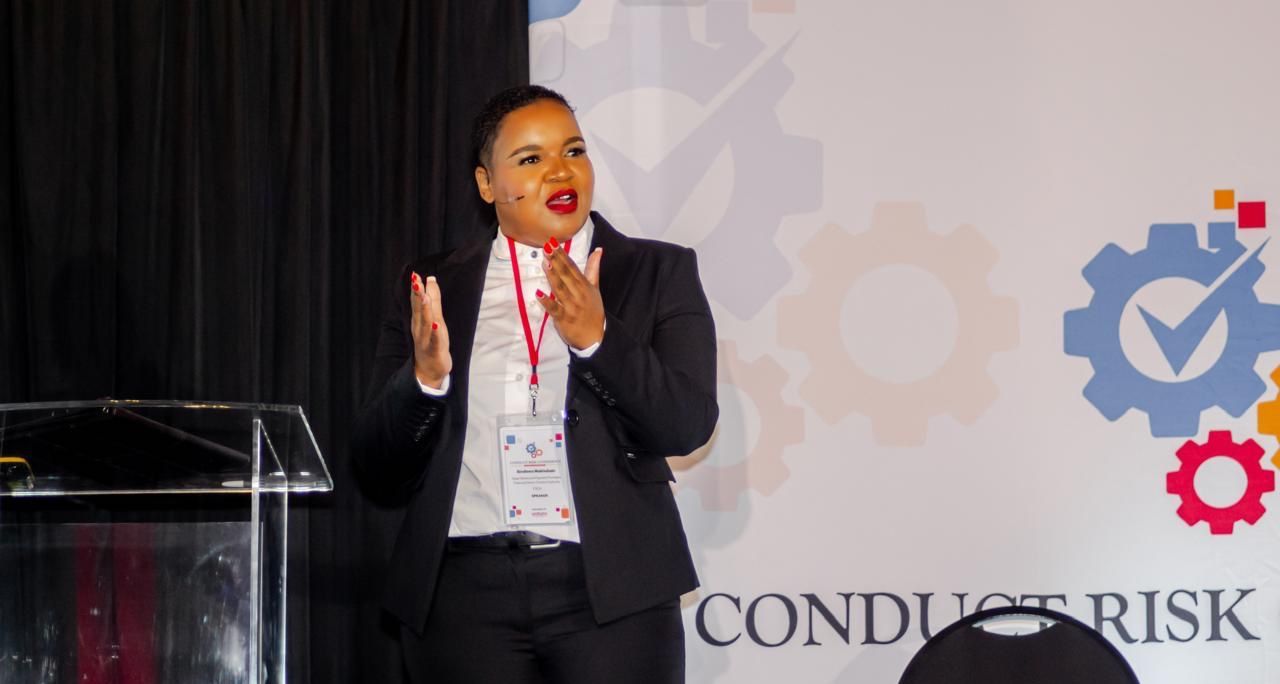
The Conduct Risk Conference held last month on the 5th and 6th of March 2025, was a remarkable event that brought together industry leaders, compliance officers, and regulatory experts to delve into the evolving landscape of conduct risk, culture, and operational risk. Expertly coordinated by Charmaine Soobramoney, who also served as the master of ceremonies, the conference was both informative and captivating. Charmaine’s dynamic energy and engaging presence ensured that each session remained lively and interactive, seamlessly transitioning between speakers and discussions.
One of the highlights of the conference was the session moderated by Tracey Chockalingam and Thunile Nkosi. Tracey expressed her absolute pleasure in partnering with Thunile to discuss the role of Chief Compliance Officers in navigating the complex regulatory landscape from 2024 to 2025 and beyond. Their session provided deep insights into the challenges and strategies for compliance in a rapidly changing environment. Esteemed panelists Portia Twala, Shabnam Sablay Parker, and Pieter Erasmus enriched the discussion with thought-provoking insights and practical examples, leaving attendees with much to consider regarding the added responsibilities and accountability in the regulatory landscape.
Sindiswa Kahla-Makhubalo delivered a compelling presentation on “Conduct Risk, Culture, and Operational Risk – A Regulator’s View.” Her insights provided valuable feedback and perspectives on the interconnectedness of these elements, emphasizing the importance of fostering a culture that values ethical conduct. This presentation highlighted how a strong, positive organizational culture promotes ethical behavior, accountability, and transparency, which are crucial for managing conduct risk and enhancing operational risk frameworks.
Francis Ndende, a global consultant and expert in legal, compliance, and anti-corruption, and the current CEO of CII-Africa, reflected on the conference’s success. He emphasized the importance of ethical conduct in mitigating operational risk and shared his gratitude for the opportunity to engage with like-minded professionals. His reflections underscored the significance of maintaining a high level of accountability and integrity within institutions to effectively manage conduct risk.
A standout session at the conference was the panel on AI compliance, featuring Francis Ndende, Rianne Potgieter, and Kezia Talbot. The discussion covered a range of critical issues, including key AI regulatory developments and their impact on businesses, strategies for staying ahead of evolving regulations like the EU AI Act, and differences in AI laws across jurisdictions. The panelists also addressed best practices for global AI compliance while maintaining operational efficiency, the intersection of AI and data protection laws, and the establishment of robust AI governance frameworks. Their insights into managing vendor risks and ensuring third-party AI tools meet compliance requirements were particularly valuable. The role of human oversight in AI compliance and how AI itself can be leveraged to enhance compliance and risk management were also key topics of discussion.
The Conduct Risk Conference 2025 provided invaluable insights into the importance of ethical culture, accountability, and the interconnectedness of various risks within organizations. One of the primary takeaways was the emphasis on fostering a strong, positive organizational culture. Such a culture promotes ethical behavior, accountability, and transparency, which are essential for managing conduct risk effectively. Another critical point highlighted was the necessity for institutions to operate with high levels of accountability and integrity. This approach ensures that conduct risk is managed not just through policies but through a deep-rooted cultural commitment. The conference underscored that awareness of conduct risk is crucial for maintaining organizational integrity. Without this awareness, organizations may face significant operational risks due to a disconnect between conduct and culture.
Upholding ethical behaviors within the organization was also deemed essential for long-term success. This focus on ethical standards helps mitigate risks and drives sustainable success. Additionally, the conference stressed the importance of focusing on long-term viability rather than short-term profits. This perspective ensures that organizations remain resilient and trustworthy in the eyes of stakeholders.
In summary, the Conduct Risk Conference 2025 highlighted the need for a holistic approach to managing conduct risk. By fostering an ethical culture, maintaining accountability, and being aware of the interconnectedness of various risks, organizations can achieve long-term success and sustainability. Organized by Umbono Conferences and Events, the conference was a resounding success, providing a platform for meaningful discussions, knowledge sharing, and networking among professionals deeply invested in shaping the future of compliance. A special thank you to Charmaine Soobramoney for her energy and dynamic conversation, and to all the speakers and attendees who contributed to the event’s success. The conference underscored the importance of ethical conduct, robust compliance frameworks, and the interconnectedness of conduct risk, culture, and operational risk in today’s dynamic business environment. We look forward to continued collaboration and insights in this evolving space.


